
The most unabashedly videogame-ish movie in cinematic history, Hardcore Henry is a bold act of mimicry, a gimmicky stunt and a faithful adaptation of gaming’s form and content. Executed by first time writer-director Ilya Naishuller with a go-for-broke showmanship that’s at once breathtaking and nauseating, this adrenalized action film revolves around a central conceit: namely, that its tale is told exclusively through its hero’s perspective, à la Xbox, PS4 and PC first-person shooters (FPS). That protagonist is a blank slate named Henry, who at story’s outset awakens—or, rather, is resurrected—by a beautiful doctor named Estelle (Haley Bennett) who claims to be his wife, and bestows him with a new, mecha left arm and leg. In other words, he’s a man rebooted as an electronic superman.
That introductory sequence (prefaced by a dreamy flashback involving Tim Roth that isn’t explained until much later) recalls the visor initiation sequence of Paul Verhoeven’s 1987 Robocop, a similar tale of a dead man being reborn as a memory-plagued machine. Naishuller embellishes his saga with other big-screen allusions—most notably, the fleeting sight of a poster for the 1947 noir Lady in the Lake, which also assumed a first-person POV. However, his real source material are games like Halo, Call of Duty and, in particular, Bioshock. The last of those serves as inspiration for Naishuller’s plot, about a voiceless amnesiac hero on a quest throughout Russia to save his wife and kill his cruel maker, a flaxen-haired telekinetic psycho named Akan (Danila Kozlovsky). It also provides the template for Hardcore Henry’s underlying themes about the search for (and formulation of) identity, as well as the inherently manipulative relationship between artists and audiences.
Forced to flee his birthing chamber before his vocal capabilities can be restored, Henry is established as the same type of blank-slate proxy as your average FPS protagonist. He’s only defined by his tattooed hands, his wire port-pockmarked torso and his feet—appendages, which extend out from the screen and are thus front and center during the breakneck action. Hardcore Henry is a nonstop barrage of movement: punching, shooting, stabbing, falling, leaping, hanging, sliding and scrambling. Naishuller’s handheld camerawork is a flurry of shifting visual angles, accurately reflecting Henry’s all-over-the-place viewpoint as he hurdles railings, navigates bridge beams, is propelled off van roofs by exploding grenades, and engages in all sorts of spastic melee and firearm combat. The film’s kineticism is exhausting, if not borderline punishing, and no doubt those prone to motion sickness will find its aesthetic assault intolerable after roughly 10 minutes.
Hardcore Henry is not for the faint of heart (or stomach), and that extends to its ultraviolence, which involves heads being severed by swords and shattered by gun blasts, and bodies being riddled with bullets, always in up-close-and-personal fashion. Like characters’ proclamations of their heterosexuality and the many nude strippers and prostitutes on display, this brutality is part and parcel of the film’s—and FPS games’—primal, juvenile ultra-macho essence. Naishuller understands that such fantasies are predicated on particular aggro-manly urges to maim, kill and screw; in that regard, his saga effectively channels its interactive ancestors with uninhibited glee.
In every respect, Hardcore Henry aims to be a filmic variation on an FPS. Its story is comprised of familiar types of “levels” (involving hand-to-hand battles, machine gun firefights, vehicular sequences and sniper rifle scenes) that often culminate with showdowns against imposing “bosses,” and Henry must repeatedly find ways to enhance his abilities (i.e., to “power up”) as well as to restore his waning health meter (via medical kits, or cyborgian augmentation). He employs a variety of increasingly outlandish weapons, and his adventure is often interrupted by brief video monitor messages from his wife that help propel the narrative forward. And then there’s the figure of Jimmy (District 9’s Sharlto Copley)—or should I say “figures,” since Jimmy materializes repeatedly along Henry’s mission in different, equally outlandish guises, only to quickly perish. Copley is the jovial comedic relief for this otherwise harsh, hostile film. However, his function is not just to lighten the mood, but also to serve as the plot’s chief forward-momentum mechanic, providing Henry with GPS objectives to accomplish, and motivating him to reach a secret laboratory.
Jimmy’s true nature is the first of two major surprises, both of which speak to the I-manipulate-you, you-manipulate-me rapport shared between viewer and movie, player and game. As in Bioshock, Hardcore Henry is ultimately concerned with using its formal conceit and construct-your-identity/kill-your-paternal-God storyline to emphasize, and investigate, the way we project ourselves into fictions to assert some measure of control over them, and over our own destiny—and the way those fictions, in turn, affirm their own dominion over our experiences. The fact we have no say over Henry’s actions hinders the film’s ability to truly get into these tricky dynamics, but they remain ever present, hovering around the edges of Henry’s POV, and the mass-scale carnage he leaves in his wake.
Not that those weighty issues are addressed overtly throughout this lunatic extravaganza; in its most basic form, Naishuller’s film merely wants to thrill via orgiastic kill-’em-all chaos. Nonetheless, lurking beneath its outrageous exterior, this exercise in videogame imitation doesn’t just make you want to grab a controller—say, for the inevitable PS4 (or Oculus Rift virtual-reality!) adaptation—but, better still, it compels one to ponder who’s playing who in such first-person bloodbaths.
Director: Ilya Naishuller
Writer: Ilya Naishuller
Starring: Haley Bennett, Danila Kozlovsky, Sharlto Copley
Release Date: April 8, 2016